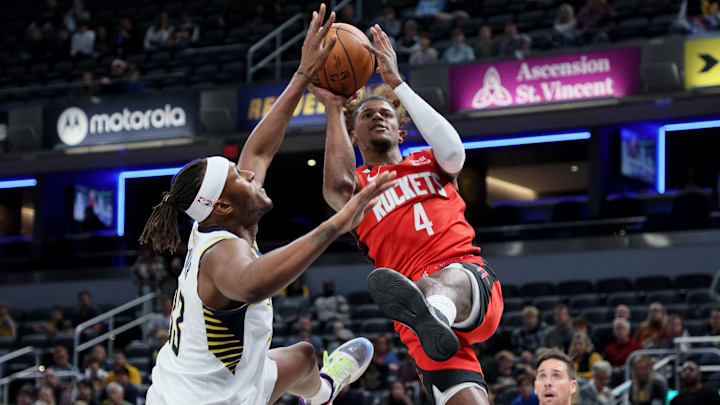The Houston Rockets kick off a four-game homestand against the Indiana Pacers on Friday, November 18. The Rockets have officially moved out of the league basement after the Detroit Pistons fell to 3-13. However, a loss against the Pacers would move them back into a tie with Detroit for the worst record in the league.
The Pacers, who were widely expected to prioritize lottery odds this season, have posted a surprising 7-6 record. What’s the culprit behind their unanticipated basketball mediocrity? They actually held on to their good players and didn’t actively try and bottom out.
Myles Turner and Buddy Hield may feel like Los Angeles Lakers, but they are very much Pacers, and it’s paying off. Hield is averaging 18.8 points per game on 41.6% 3-point shooting, and Turner is slashing an impressive 18.1 points, 8.9 rebounds, and 3.1 blocks per game on an effective field goal percentage of 59.4%.
The Rockets and Pacers are both coming off of wins. The Rockets set a Mavericks’ record with 19 blocks in their 101-92 win, while the Pacers beat the hapless Charlotte Hornets 125-113. After starting the season 1-4, the Pacers have gone 6-2 and look like a real playoff contender. These are the stats to know, players to watch, and X-factor for the Rockets and Pacers’ Friday night game.
Houston Rockets vs Indiana Pacers: Stats to know
The Rockets’ offensive recipe has become well-established. They crash the offensive glass, ranking second in offensive rebounding percentage at 29.4%, they generate a ton of free throw attempts that they’ll miss, they turn the ball over with ambiguity, and they shoot the ball with the accuracy of a musket.
The primary driver of the Rockets’ offense are pick-and-roll ball-handler possessions. They rank fourth in possessions per game and frequency but are 28th in points per possession at 0.76. They have found a bit more success hitting the roll man in the pick-and-roll, but their 1.07 points per possession is only 23rd. The Rockets’ ability to secure second-chance opportunities has kept their offense out of the cellar, but their 108.6 offensive rating ranks 26th in the league.
The Pacers, on the other hand, have had an electrifying offense. Their 115.6 offensive rating is seventh in the league, and 0.2 points per 100 possessions off of the Cavaliers in fourth. So how have the Pacers essentially built a top-five offense?
True to their name, the Pacers play at pace. They average 102 possessions per game, tied for the second most in the NBA. They also chuck 3-pointers with abandon yet precision. Per 100 possessions, the Pacers take 39.0 3-pointers per game and hit 38.1% of them, good for 14.9 made 3-pointers per 100 possessions.
interesting decision to leave @TyHaliburton22 that wide open. 🎯 pic.twitter.com/nO7mbf3NWM
— Indiana Pacers (@Pacers) November 17, 2022
The Pacers' offense is built on being a strong 3-point shooting side. They're average at drawing free throws, they turn the ball over a ton, and they grab offensive rebounds at slightly above league average.
Stylistically, the Pacers’ offense is somewhat unique. They’re not a pick-and-roll or isolation-heavy side. They don’t post up much, and they’re not cut or screen-heavy. However, they pass the ball a ton, ranking second in passes per game, and they move a whole lot, averaging the third most offensive miles covered per game.
The secret sauce to their offense is transition 3-pointers. The Pacers run their way to the seventh most transition possessions per game but average the second most points (26.2) and the fourth-highest points per possession (1.23).
This dizzying blend of efficiency and volume comes by virtue of 3.5 made 3-pointers per game in transition, which accounts for 23.2% of their made 3-pointers. The Pacers appear to be a running hybrid version of the Steve Nash-led Suns offense from years ago and the current Golden State Warriors. It’s a fast offense that shares the ball and bombs from threes but also has a healthy enough dose of pick-and-rolls to be unique from the Warriors’ motion-based offense.
The Pacers’ ability to get into transition and gun threes could be a massive problem for the Rockets. The Rockets’ excellent offensive rebounding has a dark side. They give up the most transition possessions per game to their opponents and allow them to score at a fourth-best efficiency (1.22 points per possession). How the Rockets balance the pros and cons of their best offensive attribute bleeding into the Pacers' best offensive trait could very well decide the game.
